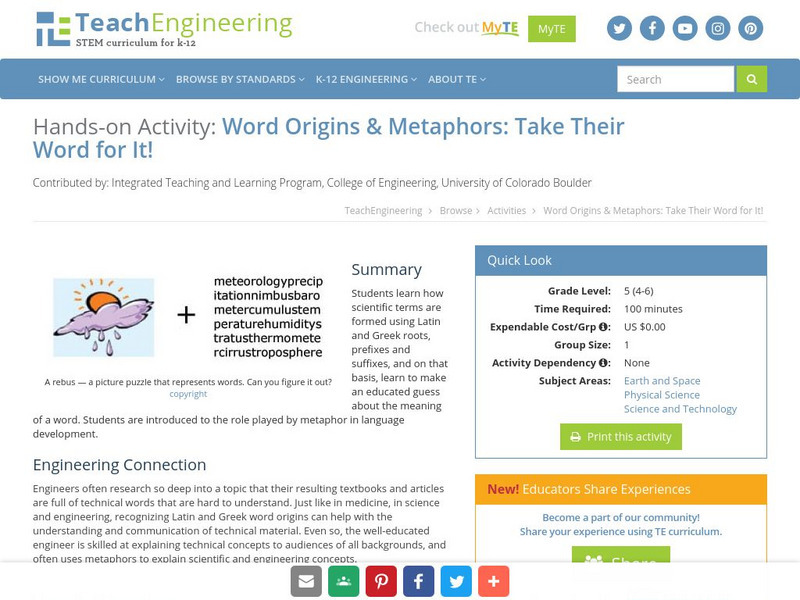TeachEngineering
Teach Engineering: Take Their Word for It!
Students learn how scientific terms are formed using Latin and Greek roots, prefixes and suffixes, and on that basis, learn to make an educated guess about the meaning of a word. Students are introduced to the role played by metaphor in...
Other
A. Word. A. Day
Still another site offering you a word a day to build vocabulary and understanding of new words. You can subscribe for free, or check out the archives.
TED Talks
Ted: Ted Ed: Mysteries of Vernacular: X Ray
The story of the word X-Ray is one of great thinkers. French philosopher Rene Descartes isolated the letters X, Y and Z to stand for unknowns, and centuries later, Wilhelm Rontgen discovered the X-ray, using the X for the unknown nature...
TED Talks
Ted: Ted Ed: A Brief History of Melancholy
If you are a living, breathing human being, chances are you have felt sad at least a few times in your life. But what exactly is melancholy, and what (if anything) should we do about it? Courtney Stephens details our still-evolving...
TED Talks
Ted: Ted Ed: The True Story of 'True'
The older the word, the longer (and more fascinating) the story. With roots in Old English, 'true' shares etymological ancestors with words like betroth and truce, but also with the word tree. In fact, trees have been metaphors for...
TED Talks
Ted: Ted Ed: Mysteries of Vernacular: Lady
Why do we call women ladies? Well, etymologically-speaking, the word comes from the Old English words for hlaf (bread) and daege (maid), which, combined, mean the female head of the household and eventually indicated high social...
TED Talks
Ted: Ted Ed: Mysteries of Vernacular: Bewilder
The history of the word bewilder is more straightforward than you might think. Roots can be traced back to the Old English words wilde (undomesticated) and deor (untamed animals), eventually combined into the word wilderness. Jessica...
TED Talks
Ted: Ted Ed: Mysteries of Vernacular: Dynamite
With an explosive meaning, the word dynamite's past is as historical as it is etymological. Jessica Oreck and Rachael Teel describe how Alfred Nobel invented dynamite. [2:14]
TED Talks
Ted: Ted Ed: Mysteries of Vernacular: Inaugurate
From avian omens to the beginning of a new policy or the reign of a new politician, Jessica Oreck follows the flight path of the word inaugurate. [2:08]
TED Talks
Ted: Ted Ed: Mysteries of Vernacular: Earwig
An earwig is neither an ear nor a wig; it is an insect. Jessica Oreck and Rachael Teel explain how folklore gave this bug its name, combining entomology with etymology. [2:16]
TED Talks
Ted: Ted Ed: Mysteries of Vernacular: Tuxedo
How did tuxedo's roots extend from Native American history to black tie evening wear? Jessica Oreck reveals what the Delaware Indians and formal fashion have in common. [2:04]
TED Talks
Ted: Ted Ed: Why Is There a "B" in Doubt?
Say the word "doubt" aloud. What is that "b" doing there? Does it have any purpose? Gina Cooke explains the long and winding history of "doubt" and why the spelling, though it seems random, is a wink to its storied past. [3:28]
Other
Take Our Word for It
A bi-weekly Webzine of word origins. Includes a Spotlight word, answers to submitted questions, a curmudgeon's corner and other areas.
Other
Etymological Dictionary: Influences on Astronomy
An interesting look at the meanings of many of the words in mythology that have been used in English astronomical field. This resource lists the word, etymological and mythological root or character, and modern English meaning.
Other
Uncp: Using a Dictionary
Curious about what a dictionary might tell you beyond how to spell a word? This site will walk you through the basics of using any dictionary, as well as suggest why you might want to consult one on a regular basis. L.9-10.4c References,...
Other
Online Etymology Dictionary
The site, created by an avowed amateur, Douglas Harper, shares the origins of words. Students will type a word into a text box and click a "search" button to see the etymology of the word.
Other
World Wide Words/exploring the English Language
"World Wide Words is devoted to the English language - its history, quirks, curiosities and evolution. The Words site is organized into sections, each with its own index to help you find your way about."
Other
Behind the Name
Site gives the etymology and history of first names. Have fun looking up yours! Names can be accessed alphabetically, by nationality, or through a search tool. Links to lots of other information on names and etymology.
Other
World Wide Words: Meritocracy
A relatively recent word, the term meritocracy is commonly used in a way not intended by the man who coined it. This article discusses the meaning of the term in its original usage, as well as its common use today.
The Guardian
Guardian: Down With Meritocracy
This article was written by the man who coined the word, and explains what political system he was describing and how it has been enacted in British politics.
Texas Education Agency
Texas Gateway: Reference Materials Printed and Electronic
Learn how to use dictionaries, glossaries, and thesauri in order to determine meanings of words and phrases, including their denotations, connotations, and etymologies.
Texas Education Agency
Texas Gateway: Cognates (English I Reading)
Use your knowledge of cognates from other languages to help you understand unfamiliar words.
Texas Education Agency
Texas Gateway: Reference Materials: Printed and Electronic
You will learn how to use dictionaries, glossaries, and thesauri in order to determine meanings of words and phrases, including their denotations, connotations, and etymologies.
TED Talks
Ted: Ted Ed: Mysteries of Vernacular: Yankee
Is it a doodle dandy? A baseball team? The origins of the word yankee are unclear, though its usage in America as a pejorative is well-documented. Jessica Oreck and Rachael Teel track the varying levels of contempt that the word yankee...

























